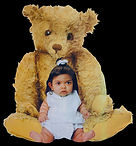In a world riddled with multiple hospitalizations, endless surgeries, orthopedic and neurological difficulties, children with severe achondroplasia and their families are too familiar with pain. The Teddy Bear Foundation is a public charity founded in 1994 to help provide these children with the medical care and financial support they need to overcome this potentially debilitating condition.
MAKE A BIG
DIFFERENCE FOR LITTLE PEOPLE

What is achondroplasia?
Achondroplasia is a hereditary, congenital form of skeletal dysplasia, commonly known as dwarfism. Over 50,000 people in the U.S. are afflicted with one of the 251 types of dwarfism-more than those suffering from either sickle cell anemia, cystic fibrosis or hemophilia. One in every 15,000 babies is born with dwarfism, most to parents of average stature..
Theodora (pictured above), for whom the Foundation was named, suffers from such a severe case of achondroplasia that she must remain connected to life supports for much of the day. Multiple life-saving surgeries have since enabled her to take her first steps, at the age of seven
What are the complications?
Children with achondroplasia battle severe, often painful maladies every day. Malformities of the body’s long bones (arms, legs, and ribs), in addition to the face and spinal column, may cause serious, life-threatening problems if left untreated. Bones that are often too short or deformed to accommodate the body’s growing internal systems can cause problems from infancy through adulthood. Brainstem compression, upper airway obstruction and inadequate chest size may cause breathing problems or lead to respiratory arrest. A narrowed spinal canal could lead to irreversible paralysis and other neurological conditions.
Improving Quality of Life
“Little People” can lead full, productive lives. Through complex reconstructive surgeries that coincide with body development, patients can regain full use of their limbs. With bone grafts, fusions, steel screws, pins and plates, combined with intensive physical therapy, deformities can be corrected, arthritic pain lessened and paralysis prevented. Early intervention can mean the difference between a lifetime of suffering and one that is free of pain.
Teddy Bear Foundation Offers Ongoing Support
The Teddy Bear Foundation for Achondroplasia understands the severe physical and emotional strain suffered by these children and their families. The Foundation’s mission is to provide access to primary care, daily maintenance and preventive services, as well as care for both acute and chronic conditions. In addition, much needed funds will be donated for the advancement of genetic research impacting on the treatment of achondroplasia.
